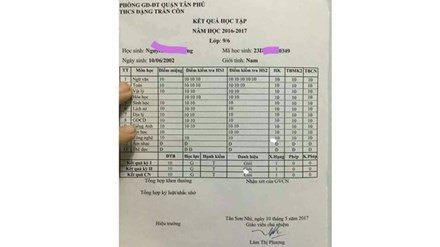From June 1, posting your child's report card online is illegal.
Many parents post their children's report cards online to share their joy, not knowing that doing so is illegal without asking the child's permission.
Put it online to get compliments
Ms. Pham Huong, Hoan Kiem District, Hanoi said that she used to show off her child's report card online with a cheerful mood and waited for others to praise her child because her child had a very high score. However, she also admitted that she did not feel comfortable, and sometimes even felt annoyed, when other parents showed off their child's report card online.
“I used to be someone who liked to be praised by others for my children’s good deeds and for my mother’s good deeds, so I know how other parents feel about their children being praised. Therefore, it is understandable that parents share their children’s report cards online. However, when I see other parents’ report cards, I feel hurt, hurt, impatient and can cause more frustration for my children. Not to mention, I see many parents who, even though their children’s results are normal and not better than anyone else, still share them online,” said Ms. Huong.
Ms. Dang Thi Minh in Binh Duong said that not long ago, a colleague of hers posted her child's report card online to show off to everyone. At that time, many people commented to congratulate her, but there were also comments to compare, and some even insulted her because they thought her family bought the score or showed off.
“I don’t mind other parents showing off their children’s scores online, but I don’t like it because I feel like the children are being used for their parents’ pleasure,” said Ms. Minh.
 |
| Illustration photo. |
Ms. Minh believes that many parents today do not understand that their pride can be a pressure on their children. Some parents like and brag about their children's high scores, but scold and insult them when their children get low scores. She has never shared her child's report card online because she is afraid that doing so would be comparing her child to other children.
Not hoping to receive compliments, Ms. Pham Thi Thao, Nghe An, also said that she herself has shared her child's report card online many times just to have fun, in which she shares both low and high scores.
“I think sharing my child’s report card is just for fun, not for pride or anything. I only share a few milestones at a certain time, such as the end of school, the first year, or something special. So I don’t feel bad for other parents if I show off my child’s report card. I even send my congratulations to those with good reports,” Thao said.
This mother believes that if a child has outstanding achievements that are mainly due to self-study, then showing off their report card online is something worth sharing and normal.
Ms. Vu Thi Nhung, a teacher in Nam Dinh, said she was not pleased to see parents sharing their students' report cards on social networks.
“I feel it is rude when parents keep showing off their students’ certificates and report cards online these days, because nowadays it is not difficult to have a good report card in class. Many parents even create their own report cards for their children and post them online.”
Need to clarify what is the purpose of posting online
Associate Professor, Dr. Tran Huu Duc, Senior Psychological Consultant of Better Living, believes that it is necessary to clarify the purpose of parents when posting their children's report cards and information online. Who will they give it to, and what will they do with the results after reading them? What does the result mean in this online community? Does your child know about this? What are your child's personality, values, and beliefs about this? What is your child's attitude about this? Did parents ask their child's opinion before posting?
According to Mr. Duc, children's academic results are private information and should be used with caution. Good results posted online can help children feel proud (if they know) of their academic achievements, similar to being praised in front of the school. If parents do it subtly, it can create a good effect on children. If not careful, it can cause low self-esteem when academic achievements fall behind, or arrogance if children do not try hard to study or learn modestly.
If the results are bad and are posted by parents, it will usually cause children to have a very low self-esteem. This can increase children's motivation to study by creating positive pressure, but this is a difficult and sometimes harmful way. Therefore, parents should choose many other methods of encouragement, not "shame" in this way.
If parents post just to satisfy their ego or pride, it is not advisable, because the online community will have many lame comparisons, or wrong prejudices, or even mutual animosity. Moreover, sharing personal and private information of your children on social networks is not safe.
“The current trend in educational psychology is to respect children, especially in matters related to individuals and privacy. This way of teaching will soon help children become independent, responsible, self-disciplined, self-respecting, and when they grow up, they will be independent and self-reliant citizens.
However, Vietnamese culture is a community culture. This independence, autonomy, respect for personal freedom and privacy has caused a lot of trouble for both parents and their children. In families where parents advocate respect for children's privacy and individuality, there may still be cases where parents are upset because "fish do not eat salt, fish rot", and children say "my parents do not know what I want and also spend little time with me". In families where parents try to maintain the "three obediences and four virtues" teaching style, the atmosphere in the house is very stuffy, children have little communication, often have low self-esteem or early rebellion" - Mr. Duc said.
According to Mr. Duc, the best solution is to respect the internationalization trend in every family and at the same time know how to preserve the unique and good cultural features and values. Respecting the privacy and individuality of children does not mean "ignoring it" and only worrying about making a living or getting rich. Respecting the privacy and individuality of children by giving them lots of love according to their interests and needs...
 |
| Illustration photo. |
Children also have children's rights and are protected by law.
From June 1, 2017, the Law on Children officially took effect. Accordingly, the law strictly prohibits the act of publishing or disclosing information about the private life and personal secrets of children without the consent of children aged 7 years or older and of the children's parents or guardians.
From July 1, Decree 56/2017/ND-CP of the Government stipulating a number of articles guiding the implementation of the Law on Children will also take effect. The Decree clearly stipulates that confidential information of children's private life is information about name, age, personal identification characteristics, address, school information, learning results and each of the children's friendships...
According to lawyer Tran Thi Ngoc Nu, head of the Ho Chi Minh City Children's Rights Protection Lawyers Association, it is against the law for parents to post information about their children online without their consent. Moreover, posting information online is an excuse for bad guys to get hold of the information and do bad things like kidnapping, taking children to do bad things or forcing them to do things they are not allowed to do.
Parents showing off their children's report cards online can make their children feel ashamed if they do poorly compared to their friends, or arrogant if they have good reports and receive many compliments. This can destroy their children's will to strive to improve in their studies.
“A child came to me and said that he had intended to run away from home because he was very sad because every time his uncles and aunts came to visit, his parents kept making fun of him. They even said they would send him to their friends to tutor and guide him in his studies,” Ms. Nu said.
Parents should closely monitor, share and educate their children, promote their children's self-learning, and not compare them with others. In addition, they should encourage their children to study, teach them skills to prevent and protect themselves, and always respect their opinions.
According to VNN




